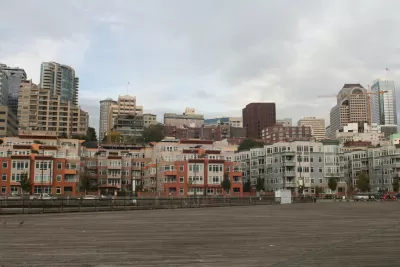The mayor and a councilmember both made potentially sweeping proposals to address displacement as the city moves forward with plans to upzone neighborhoods, in keeping with the Mandatory Housing Affordability policy.

Seattle Mayor Jenny Durkan recently announced an executive order [pdf] that proposed policies for stemming displacement.
Stephen Fesler reports on the executive order, describing it as "very much an all-hands-on-deck kind of policy platform." Fesler also parses the proposed policies into four themes:
- Implementing a suite of short-term actions in 2019 to address displacement and affordability;
- Pushing the state legislature to provide more resources and tools to provide more housing affordability and reduce displacement;
- Continued commitment to the Equitable Development Initiative (EDI), which helps address issues of displacement and gentrification; and
- Commit to community engagement and interdepartmental collaboration to address displacement.
If you're wondering where the city's Mandatory Housing Affordability (MHA) policy fits into the new proclamation, according to Fesler, "[the] executive order also reaffirms her administration’s commitment to the MHA program with intent to monitor its performance and deliver 6,000 affordable housing units by 2028."
Seattle Councilmember Lisa Herbold released a similar proclamation on the same day, to announce draft legislation "that could provide additional tools for decision-makers to rely upon through the permitting process to reduce displacement risks to residents in areas of the city that are considered to be high risk of displacement and low access to opportunity." Those areas are identified as "Urban Villages" identified in the city's Comprehensive Plan as South Park, Bitter Lake, Rainier Beach, Othello, and Westwood-Highland Park.
In Herbold's case, the legislation is drafted in part as a response to concern about the effects of MHA upzones. Fesler provides a lot of additional analysis about the potential implications of the new legislation vis-à-vis the MHA.
FULL STORY: Mayor Durkan and Councilmember Herbold Each Propose Anti-Displacement Strategies

Planetizen Federal Action Tracker
A weekly monitor of how Trump’s orders and actions are impacting planners and planning in America.

DARTSpace Platform Streamlines Dallas TOD Application Process
The Dallas transit agency hopes a shorter permitting timeline will boost transit-oriented development around rail stations.

Congressman Proposes Bill to Rename DC Metro “Trump Train”
The Make Autorail Great Again Act would withhold federal funding to the system until the Washington Metropolitan Area Transit Authority (WMATA), rebrands as the Washington Metropolitan Authority for Greater Access (WMAGA).

Supreme Court Ruling in Pipeline Case Guts Federal Environmental Law
The decision limits the scope of a federal law that mandates extensive environmental impact reviews of energy, infrastructure, and transportation projects.

Texas State Bills to Defund Dallas Transit Die
DART would have seen a 30% service cut, $230M annual losses had the bills survived.

Bikeshare for the Win: Team Pedals to London Cricket Match, Beats Rivals Stuck in Traffic
While their opponents sat in gridlock, England's national cricket team hopped Lime bikes, riding to a 3-0 victory.
Urban Design for Planners 1: Software Tools
This six-course series explores essential urban design concepts using open source software and equips planners with the tools they need to participate fully in the urban design process.
Planning for Universal Design
Learn the tools for implementing Universal Design in planning regulations.
Roanoke Valley-Alleghany Regional Commission
City of Mt Shasta
City of Camden Redevelopment Agency
City of Astoria
Transportation Research & Education Center (TREC) at Portland State University
US High Speed Rail Association
City of Camden Redevelopment Agency
Municipality of Princeton (NJ)





























